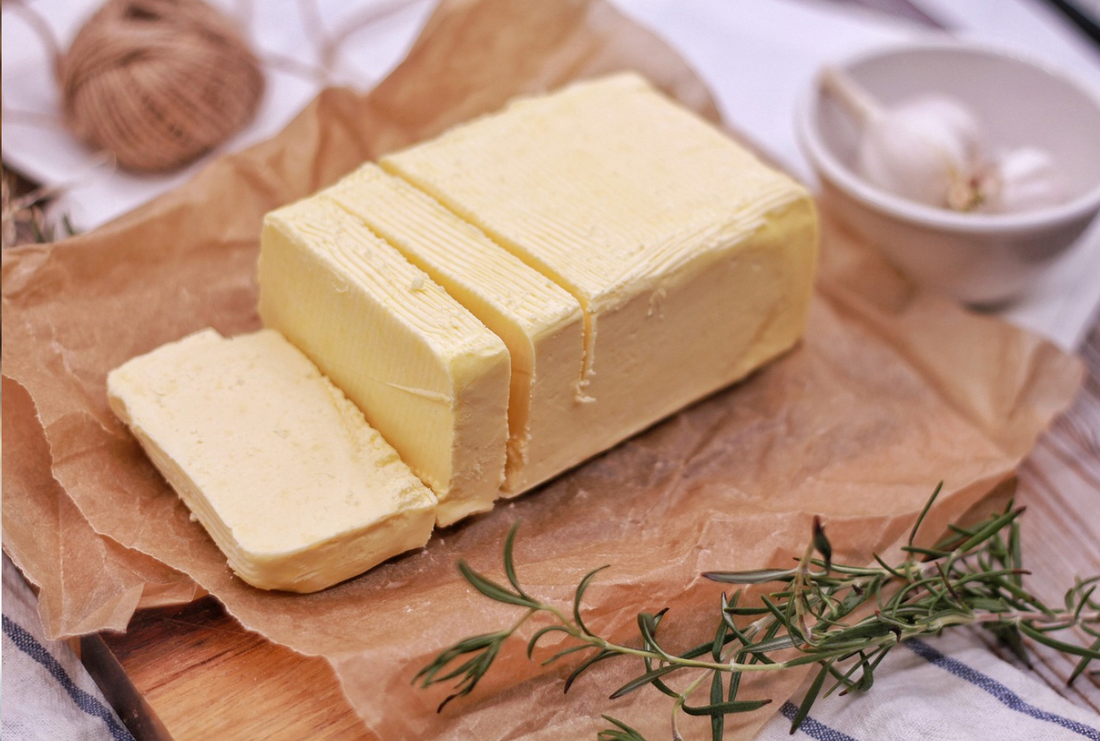Addressing the topic of cooking oils can feel like stepping into a field full of mines. Nevertheless, putting the finger on the detrimental effect most mainstream cooking oils can have on your general health is more than necessary.
In this article we will delve into why saturated fatty acids like beef tallow, lard or organic coconut oil (among others) are much healthier fat to cook your food in compared to vegetable oils.
SFA, MUFAS, PUFAS: What are These?
Before addressing the reason why it is important for you to really pay attention to the cooking oils you are using, let's quickly browse through the semantics of the world of fatty acids.
Fatty acids are the main molecules constituting fatty substances or lipids. They are formed of chains of carbon atoms linked to hydrogen atoms. Fatty acids mainly constitute a source of energy (1g of lipids = 9 kcal) and participate in the proper functioning of the body and the various metabolic systems. In addition to having an energetic role, fatty acids will also have a structural, metabolic, anti-inflammatory and protective role for the cardiovascular and cerebral system. There are around forty different fatty acids, among which we distinguish in particular these three categories:
We now have to insist on the reason why Polyunsaturated fatty acids (PUFAS) should not exist in your diet. To explain it clearly we are basing our knowledge on the research from the biologist and biochemist Ray Peat who has based his dietary philosophy on his research and findings on the endocrine system and metabolism.

Next, we’ll be looking at why PUFAs aren’t so great for your long-term health.
- Source and Extraction of PUFAs:
- PUFAs, like those found in sunflower oil and canola oil, are primarily extracted from plant seeds.
- These oils serve as a natural defense mechanism for plants, protecting seeds from being eaten by animals.
- Effect of PUFAs on Digestion (Based on Dr.Ray Peat's Research):
- Dr.Ray Peat, a biologist and biochemist, states that PUFAs can interfere with digestive enzymes in animals' stomachs.
- According to Dr. Peat, since digestion is a fundamental biological process, and other systems in the body are built on variations of the digestive system, PUFAs can potentially harm these systems as well.
- Instability of PUFAs at High Temperatures:
- PUFAs are liquid at cold temperatures but become unstable and prone to oxidation (rancidity) when warm and exposed to oxygen.
- Dr. Peat suggests that when these oils are stored in our body tissues, which are warmer and more exposed to oxygen than seeds, their oxidation tendency increases.
- This oxidation can damage cell components, including enzymes, and impair the cells' energy production capabilities.
In summary, according to Dr.Ray Peat's research, PUFAs can interfere with digestion and other bodily systems due to their effect on digestive enzymes, and their instability at body temperatures may lead to cellular damage, particularly affecting energy production in cells.
As opposed to PUFAS, saturated fatty acids such as tallow, ghee, or organic coconut oil which are solid at room temperature remain stable when heated and are not dangerous for your metabolism, your hormonal balance and your system as a whole.
Looking for Hidden Ingredients: PUFAs are Everywhere
PUFAs exist in the majority of processed foods you’ll find in grocery stores and convenient stores. This includes but isn’t limited to: Cereals, chips, popcorn, roasted nuts, snack bars, protein shakes, bakery items, canned goods, frozen meals, nut and oat milks, dried fruit, and nearly every food that comes pre-cooked and prepackaged will likely contain either canola oil, vegetable oil, or sunflower oil. Even processed food items labeled with ‘USDA Organic’, ‘Gluten-Free’ or ‘Vegan’ will contain these oils. Perhaps it is better known in recent years, but ‘Vegan’ doesn’t always equate to being healthy and nutritious, which is further discussed in this article, The Pitfalls of Plant-based Eating, if you want to find out more. So whether you are on the run and needing a sugar boost, or looking for a clean coping snack, be sure to be on the lookout for PUFAs.
PUFAs are in processed foods because most companies cook or bake their ingredients in some type of oil to preserve the flavor and retain some of its nutritional value. To make their products both affordable and accessible, they are likely going to put more resources into the star ingredients, rather than what it is being cooked in. For instance, many supposedly ‘clean’ and ‘health-conscious’ brands will cook their food items in PUFAs. For example, below is the ingredient label for MadeGood’s Granola Bars, which are technically “USDA Organic, Gluten-Free, and Vegan”:

Like most health food items, this one is also baked with sunflower oil. So while the ingredients may be better alternatives to other brands on the market, when these are regularly consumed over time, there may be problematic health concerns that will follow.
If you aren’t big on eating prepackaged snacks, that’s great. However, it's even more crucial to reconsider the types of oils you use for cooking at home, especially if you cook regularly.
ANIMAL FATS, the Alternatives to PUFAs
If you type “saturated fatty acids” in your search engine you will probably only find results telling you that they should either be avoided at all cost or that they should represent a very small percentage of your calorie intake during the day. Cooking with lard, ghee, or beef tallow seems to be the gateway to the worst cardiovascular diseases you can imagine.
To start understanding why animal fats should be your primary source of fat intake we need to take a look at the evolution of our species. Before vegetable oils became predominant in our modern world human beings have been thriving on saturated fats derived from animal food.
Published studies from pioneers like Dr Mary Enig are also debunking correlations between a diet high in saturated fats and cancer occurrence (Dietary fat and cancer trends--a critique).
More than half of your brain is made up of fat, and the majority of that fat is saturated fat and cholesterol. Synapses (every thought that turns into physical action) need cholesterol. The myelin that surrounds neurons is rich in cholesterol. Cholesterol is necessary for the growth of neurons and the connection between them (Brain cell type-specific cholesterol metabolism and implications for learning and memory)
Saturated fats also have a positive impact on your liver. Having a fatty liver (hepatic steatosis) without alcohol consumption is increasingly common, it’s called a non-alcoholic fatty liver disease (NAFLD). What majorly contributes to this is an excessive consumption of polyunsaturated vegetable oils associated with processed food and grain based products.
Your heart is also surrounded by a coat of fat, made of saturated fat. The following study shows that a consumption of saturated fats decreases the level of lipoprotein plasma (that can cause cardiovascular disease if too high in blood circulation) (Plasma lipoprotein (a) levels in men and women consuming diets enriched in saturated, cis-, or trans-monounsaturated fatty acids)
Some essential vitamins like vitamins A and K2 are abundant in animal fats, they play important roles in our health and most of the time our diets lack them. Combined with vitamin D, these vitamins form a trio called “activators” which work together to allow the proper use of minerals in the body. Vitamin A for example is only found in animal products (liver, offal, butter). It is essential for strong immunity, for eye health, thyroid health to give a few examples and Vitamin K2 is abundant in fat from grass-fed animals.

What is this telling us? It brings us back to the point made at the beginning of this section. We have been thriving as a species through millions of years surviving on animal based fat and meat. Our bodies are designed to absorb nutrients in the best way when they are coming from an animal source. That’s how our cells work. Sure, supplements exist and some plants also have vitamins in them but your system will have to engage in all sorts of chemical reactions in order to extract the nutrients and lead them to the desired place losing some of the benefits of the said nutrients along the way. With animal-sourced products, the nutrients are directly available in a state that your body can immediately deal with in its purest way.
On the same topic when it comes to your gut microbiome, cooking your food with healthy fat will promote a better absorption by the bacteria and promote an anti-inflammatory environment. For more information on this, check out this other Functional Patterns article on Healthy Gut Flora and Inflammation.
Finally you should also consider that aspect: to get beef tallow as a product the process is pretty straight forward. However getting any vegetable oil on your table or supermarket shelves is a whole other story involving chemicals and mechanical processes. And that is regardless of the oil being organic or not, those seeds need to be crushed and processed to get the oil out of them and make it edible.
The Smoke Point

Now that we know why saturated fats are critical in our diet we need to discuss an important aspect. When cooking with beef tallow, lard, organic avocado oil or any other saturated cooking fat you need to pay attention to what is called the smoke point. The smoke point refers to the temperature at which the oils stop shimmering and start smoking. The smoke point differs depending on which fat you are using, and can range from 325°F (162°C) to more than 500°F (260°C). When the fat has reached its smoke point that’s when it starts to break down which means that its chemical structure is degrading and it becomes harmful to consume it. When the smoke point has been reached, a substance called acrolein gets released along with free radicals (chemicals associated with cell damage and linked to illness, aging, and even cancer).
For example, beef tallow has a smoke point of 480°F (250°C), organic coconut oil of 400°F (204°C) and butter 302°F (150°C).
That variable will be important to consider to keep the healthy benefits of the cooking fat you are using.
Conclusion
Choosing to cook your food in organic coconut oil instead of safflower oil for instance is an essential step forward to stop the degeneration of your cells, promote a better hormonal balance and protect the symbiosis in your gut microbiome.
Obviously that overall balance will not only be about the oil; what you cook in it will matter, as cooking oil is only one component in a system of choices that determine your health and wellness. Frying frozen breaded fish sticks in a pan full of lard will not solve the problem.
For the highest grade of animal fats, make sure to check the source of the animal fat you are buying. Grass-fed animals make the healthiest fat, but if the animals have been fed grains and soy, their fat will be impacted and it will even make it toxic for you to eat.
When you have ticked that “healthy oil” box, have a look at the other elements of your life that need to be addressed to really move forward towards a healthier and better functioning body. On the subject of diet for example try no to eat too late to help your digestive system do its job properly and absorb all the nutrients you need to have enough energy to go about your next day. This will be linked to your circadian rhythm, your internal clock.
We at Functional Patterns consider a large spectrum of elements that, when put together, can help you get on a more regenerative path whether it comes to fighting inflammation, digestive issues, getting better at managing your anxiety, or addressing chronic pain.







